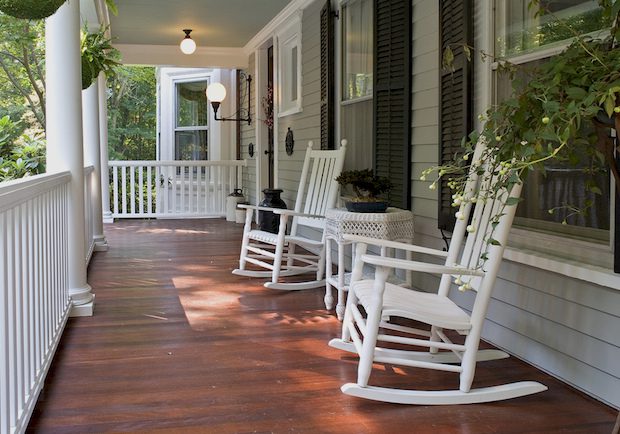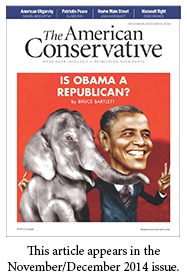Front Porch Revolution

What is “localism”? It’s a vision of civic involvement and community that, at root, is summed up in one phrase: “Love thy neighbor as thyself.” As Katherine Dalton, a senior editor for the Front Porch Republic (FPR), puts it: “Our love of country is a very little, very local thing. You can’t love something or someone without knowing it well.”
FPR, an online journal that advocates localism and traditional conservatism, holds an annual conference with a handful of localism-minded speakers. This year’s gathering took place in Louisville, Kentucky, in September, with 150 people in attendance: a diverse mix of undergraduate and graduate students, scholars and professors, young married couples and local Kentuckians.
One elderly gentleman sat with his wife near the back of the auditorium, wearing glasses and a tweed blazer. It was only after the speakers began that I saw him there, his notebook and pen at the ready. It was Wendell Berry, the conference’s keynote speaker. I’ve not seen many keynoters show up early for conferences—and I’ve never seen one sit through the several hours of lectures before and after his speech. Yet there Berry sat: the award-winning author, poet, environmentalist, farmer, and critic, listening to speakers talk about the importance of tending to place and building community. Throughout the day testimony to Berry’s work was significant—several speakers referenced his poems and his novels Hannah Coulter and Jayber Crow. When his time came to speak, Berry told us, “I keep living to see things I’ve never expected to see. This is very moving for me.”
Mark Mitchell, another of FPR’s senior editors, believes the localist movement has reached “a certain point of credibility” through the influence of figures like Berry. Yet people’s knowledge of the movement is still somewhat limited—they identify it with buying goods from farmer’s markets or local coffee roasters. Thus, the theme of this year’s conference: “Localism Beyond Food.” Civic involvement is integral to localism, Mitchell says. This means getting to know one’s neighbors, even attending town hall meetings or getting involved in a local philanthropic organization. It’s about conserving neighborhoods—be they urban or rural—so that their heritage, traditions, and communities are not lost.
“Knowledge of a place is multi-generational, passed down through families and communities,” says Jeff Polet, editor-in-chief of FPR and a professor at Hope College in Michigan. “In destroying regional community, we are asked to love a body”—that is, a country—“that has grown cold.” Simple things like cultivating relationships with local businesses are important politically, Mitchell says: good politics grow out of “civic friendships,” common affections that supersede rancorous partisanship. These foster a “political context” that is healthier and fuller than the “red-meat politics” we see on television.
“Partisan differences aren’t as large at the local level,” Mitchell says. There are more “common concerns and interests”: issues often lack the ideological implications of larger political debates. Beyond this, the principle of proximity remains: one speaks more softly to one’s neighbor. We don’t mind shouting at anonymous commenters on news sites or at faraway bloggers and commentators; it’s a different thing to shout at the man who lives down the street. “We are emboldened by anonymity and distance,” Mitchell says. “Neighborliness has a tempering influence.” Wendell Berry is an example of the way localists defy party structures and schismatic divides: he’s an outspoken environmentalist who often lambasts capitalists for their ruthless treatment of land and resources, yet he also upholds traditional family values and principles of conservation that are decidedly conservative. He inspires—and angers—people on both the left and right. This is true of localism as a whole: many conservatives and liberals alike look at the movement with suspicion and distrust. They are accustomed to the status quo, the stereotypical left-right distinctions, Mitchell says. 
But as people like Wendell Berry continue to rise in prominence—he delivered the National Endowment for the Humanities’ prestigious Jefferson Lecture in 2012—more Americans may begin to understand the purpose behind localism. Mitchell believes that young people “get it best”: they understand the importance of place, rootedness, and commitment to one’s community.
Mitchell wants to keep FPR’s conferences small and personal. “There’s a proper scale to a healthy conference,” he notes. His hopes for “growing” the movement as whole are similarly simple and particular: he encourages those interested to plant a tree. To join a choir. To practice hospitality—“be a host, share your life.” Rather than dealing in abstractions and global efforts, localism is about concrete realities and particular circumstances. Berry himself rarely leaves Kentucky: he’s grounded himself so fully in his farm and local community he doesn’t like to leave. His example answers the question of just what localism ought to be.
Gracy Olmstead is an associate editor of The American Conservative.